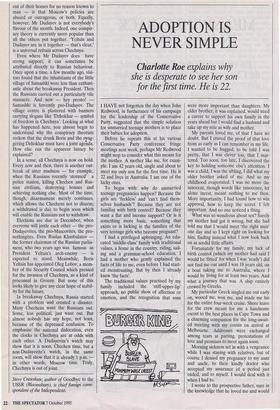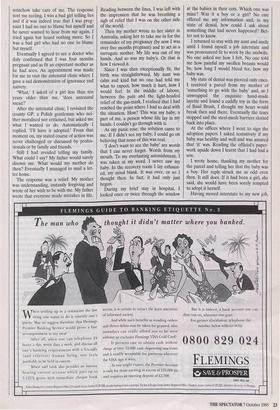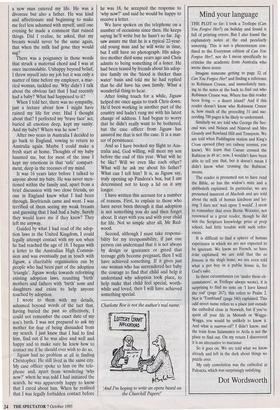ADOPTION IS NEVER SIMPLE
Charlotte Roe explains why
she is desperate to see her son for the first time. He is 22.
I HAVE not forgotten the day when John Redwood, in furtherance of his campaign for the leadership of the Conservative Party, suggested that the simple solution for unmarried teenage mothers is to place their babies for adoption.
Before he repeats this at his various Conservative Party conference fringe meetings next week, perhaps Mr Redwood might stop to consider what this means for the mother. A mother like me, for exam- ple. I am 42 years old, single and about to meet my only son for the first time. He is 22 and lives in Australia. I am one of the lucky ones.
To begin with: why do unmarried teenage pregnancies happen? Because the girls are 'feckless' and 'can't find them- selves husbands'? Because they are not familiar with birth control? Because they want a flat and income support? Or is it something more basic, something that exists or is lacking in the families of the very teenage girls who become pregnant?
I had a privileged upbringing. An edu- cated 'middle-class' family with traditional values, a home in the country, riding, sail- ing and a grammar-school education. I had a mother who gently explained the facts of life to me, even before I had start- ed menstruating. But by then I already knew 'the facts'.
The traditional values practised by my family included the 'stiff-upper-lip' approach, no public show of affection or emotion, and the recognition that sons were more important than daughters. My elder brother, it was explained, would need a career to support his own family in the years ahead but I would find a husband and take up my role as wife and mother.
My parents loved me, of that I have no doubt. But I craved the proof of that love from as early as I can remember in my life. I wanted to be hugged, to be told I was pretty, that I was clever too, that I mat- tered. Too soon, too late, I discovered the key to holding someone else's attention. I was a child, I was the sibling, I did what my older brother asked of me. And so my childhood evaporated. I was no more the innocent, though words like innocence, let alone incest, meant nothing to me then. More importantly, I had found how to win approval, how to keep the secret. I felt important. And no one noticed a thing.
What was so wondrous about sex? Surely my mother had got it wrong, but she had told me that I would meet 'the right man' one day and so I kept right on looking for him, finding instead what I now look back on as sordid little affairs.
Fortunately for my family, my lack of birth control (which my mother had said I would be 'fitted' for when I was 'ready') did not find me out until I was 18 years old, on a boat taking me to Australia, where I would be living for at least two years. And what a journey that was. A ship entirely crewed by Greeks.
My particular Greek singled me out early on, wooed me, won me, and made me his for the entire four-week cruise. Shore leave for the crew meant for me a handsome escort to the best places in Cape Town and a charming companion for the long-await- ed meeting with my cousin on arrival at Melbourne. Addresses were exchanged among tears at parting, protestations of love and promises to meet again soon.
Morning sickness set in with a vengeance while I was staying with relatives, but of course I denied my pregnancy to my aunt and uncle, to their kindly doctor who accepted my assurance of a period just ended, and to myself. I would deal with it when I had to.
I wrote to the prospective father, sure in the knowledge that he loved me and would somehow take care of me. The response sent me reeling. I was a bad girl telling lies and if it was indeed true that I was preg- nant I had no one to blame but myself and he never wanted to hear from me again. I tried again but heard nothing more. So I was a bad girl who had no one to blame but myself.
Eventually I agreed to see a doctor who duly confirmed that I was four months pregnant and as fit an expectant mother as he had seen. An appointment was made for me to visit the antenatal clinic where gave a sad demonstration of ignorance and naivety.
'What,' I asked of a girl less than ten years older than me, 'does antenatal mean?'
After the antenatal clinic, I revisited the county GP, a Polish gentleman who nei- ther moralised nor criticised, but asked me what I wanted to do. Automatically I replied, 'I'll have it adopted.' From that moment on, my stated course of action was never challenged or discussed by profes- sionals or by family and friends.
Still I had avoided telling my family. What could I say? My father would surely disown me. What would my mother do then? Eventually I managed to mail a let- ter home.
The response was a relief. My mother was understanding, instantly forgiving and wrote of her wish to be with me. My father wrote that everyone made mistakes in life. Reading between the lines, I was left with the impression that he was breathing a sigh of relief that I was on the other side of the world.
Then my mother wrote to her sister in Australia, asking her to take me in for the remainder of my pregnancy (by now I was over five months pregnant) and to act as a surrogate mother. My life was out of my hands. And so was my baby's. Or that is how I viewed it.
Since I was then exceptionally fit, the birth was straightforward. My aunt was calm and kind but no one had told me what to expect, how much it hurt, how I would feel. In the middle of labour, between the pain and the light-headed relief of the gas-mask, I realised that I had reached the point where I had to deal with the situation. How? This was my baby, a part of me, a person whose life lay in my hands. I couldn't go through with it. As my panic rose, the solution came to me. If I didn't see my baby, I could go on believing that none of this was real. 'I don't want to see the baby' are words that I can never forget. Words from my mouth. To my everlasting astonishment, I was taken at my word. I never saw my baby. In the recovery room I lay exhaust- ed, my mind blank. It was over, or so I thought then. In fact, it had only just begun. During my brief stay in hospital, I looked once or twice through the window at the babies in their cots. Which one was mine? Was it a boy or a girl? No one offered me any information and, in my state of denial, how could I ask about something that had never happened? Bet- ter not to know.
I returned to stay with my aunt and uncle until I found myself a job interstate and was pronounced fit to work by the midwife. No one asked me how I felt. No one told me how painful my swollen breasts would be, how long I would bleed for, how my baby was.
My state of denial was pierced only once. I received a parcel from my mother of 'something to go with the baby' and, as I unwrapped the exquisite hand-made layette and found a cuddly toy in the form of Basil Brush, I thought my heart would break then and there. Eventually the tears stopped and the steel-mesh barriers slotted back into place.
At the offices where I went to sign the adoption papers I asked tentatively if my baby was healthy and well and was assured that 'it' was. Reading the official's paper- work upside down I learnt that I had had a son.
I wrote home, thanking my mother for the parcel and telling her that the baby was a boy. Her reply struck me as odd even then. It still does. If it had been a girl, she said, she would have been sorely tempted to adopt it herself.
Having moved interstate to my new job, a new man entered my life. He was a divorcee but also a father. He was kind and affectionate and beginning to make me feel less ashamed with myself, until one evening he made a comment that ruined things. Did I realise, he asked, that my breasts would never be the same again, that when the milk had gone they would sag?
There was a poignancy in those words that struck a maternal chord and I was at once inconsolable. Unhappy beyond belief, I threw myself into my job but it was only a matter of time before my employer, a mar- ried woman, tackled me. Why didn't I talk about the obvious fact that I had recently had a baby? What had happened to it?
When I told her, there was no sympathy, just a lecture about how I might have ruined my life for ever. Had I thought about that? I perfected my 'brave face' act, buried all emotion deep, kept my sanity. And my baby? Where was he now?
After two years in Australia I decided to go back to England, vowing to return to Australia again. Maybe I could make a fresh start at home. Thoughts of my baby haunted me, but for most of the time I kept my emotions in that 'safe' compart- ment, deep in the recesses of my mind.
It was 16 years later before I talked to anyone about my baby. He was never men- tioned within the family and, apart from a brief discussion with two close friends, no one in England knew what I had been through. Boyfriends came and went. I was terrified of them seeing my weak breasts and guessing that I had had a baby. Surely they would leave me if they knew? They left me anyway.
Guided by what I had read of the adop- tion laws in the United Kingdom, I could legally attempt contact with my son when he had reached the age of 18. I began with a letter to the Australian High Commis- sion and was eventually put in touch with Jigsaw, a charitable organisation run by people who had been part of the adoption 'triangle'. Jigsaw works towards reforming existing adoption laws, reuniting 'birth' mothers and fathers with 'birth' sons and daughters and exists to help anyone touched by adoption.
I wrote to them with my details, ashamed beyond words of the fact that, having buried the past so effectively, I could not remember the exact date of my son's birth. I was not prepared to ask my mother for fear of being dissuaded from my search. I just knew that I had to find him, find out if he was alive and well and happy and to make sure he knew how to contact me if he should ever wish to do so.
Jigsaw had no problem at all in finding Christopher. He still lived in the same city. My case officer spoke to him on the tele- phone and, apart from wondering 'why now?' when he was told I had initiated the search, he was apparently happy to know that I cared about him. When he realised that I was legally forbidden contact before he was 18, he accepted the response to 'why now?' and said he would be happy to receive a letter.
We have spoken on the telephone on a number of occasions since then. He keeps saying he'll write but he hasn't so far. Jig- saw assure me that he is a typical 22-year- old young man and he will write in time, but I still have no photograph. His adop- tive mother died some years ago and Chris admits to being something of a loner. He had been teased by friends about his adop- tive family on the 'blood is thicker than water' basis and told me he had replied that he did have his own family. What a wonderful thing to hear.
After losing touch for a while, Jigsaw helped me once again to track Chris down. He'd been working in another part of the country and hadn't rung me with his latest change of address. I had begun to worry that he didn't really want to be bothered, but the case officer from Jigsaw has assured me that is not the case. It is a mat- ter of persistence.
And so I have booked my flight to Aus- tralia and, God willing, will meet my son before the end of this year. What will he be like? Will we even like each other? What will he ask me about his father? What can I tell him? It is, as Jigsaw say, truly opening up Pandora's box, but I am determined not to keep a lid on it any longer.
I have written this account for a number of reasons. First, to explain to those who have never been through it that adoption is not something you do and then forget about. It stays with you and with your child for life. Not so simple after all, Mr Red- wood.
Second, although I must take responsi- bility for my irresponsibility, if just one person can understand that it is not always by design or ignorance or greed that teenage girls become pregnant, then I will have achieved something. If it gives just one woman who has surrendered her baby the courage to find that child and help it understand why adoption took place, to help make that child feel special, worth- while and loved, then I will have achieved something special.
Charlotte Roe is not the author's real name.
'And I'm hoping to write an opera based on the Churchill Papers!'












































































 Previous page
Previous page